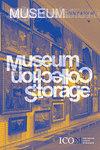The RE-ORG Method Applied to Collection Storage at the Andafiavaratra Palace Museum, Madagascar
IF 0.4
4区 艺术学
0 ART
引用次数: 0
Abstract
Abstract In June 2019, Madagascar was chosen as a host country for a RE-ORG programme, a method developed by ICCROM and UNESCO and applied transnationally to help museums to improve the management of their collections in storage. This activity, initiated by UNESCO, was financed by the government of Japan and carried out by the Ministry of Communication and Culture in Madagascar. In December 1995, the Rova of Antananarivo, which housed the historic Queen’s Palace, was destroyed by a fire. Thirty per cent of the collections saved from the flames were transferred to the Prime Minister’s Andafiavaratra Palace, now a museum. For over two decades, the unexhibited collections were stored in unstructured rooms that did not comply with principles of preventive conservation. Putting theory into practice, the RE-ORG method was applied to the royal collections at the Andafiavaratra Museum in 2019. The project primarily involved the reorganisation of the storage rooms and training during two weeks for Malagasy museum staff. A unique approach was taken: the 26 participants from 12 museums returned to their respective museums when their training was completed with the intention to reorganise or create their own storage facilities. The RE-ORG project in Madagascar led the ICOM National Committee to a general review of Malagasy museums. This case study shows how improving storage areas in Malagasy museums led to greater awareness among the local museum community and visitors on the importance of preserving cultural heritage.RE-ORG方法在马达加斯加安达菲亚瓦拉拉宫博物馆藏品存储中的应用
摘要2019年6月,马达加斯加被选为RE-ORG计划的东道国,这是一种由ICCROM和联合国教科文组织开发的方法,并在全国范围内应用,以帮助博物馆改善其藏品的管理。这项活动由联合国教科文组织发起,由日本政府资助,马达加斯加通信和文化部负责实施。1995年12月,历史悠久的女王宫所在的塔那那利佛Rova被大火烧毁。从大火中拯救出来的藏品中,有30%被转移到了首相的安达菲亚瓦拉特拉宫,现在是一座博物馆。二十多年来,这些未经禁止的藏品被存放在不符合预防性保护原则的无结构房间里。将理论付诸实践,RE-ORG方法于2019年应用于安达菲亚瓦拉特拉博物馆的皇家藏品。该项目主要涉及储藏室的重组和马达加斯加博物馆工作人员为期两周的培训。采取了一种独特的方法:来自12家博物馆的26名参与者在培训结束后返回各自的博物馆,打算重组或创建自己的存储设施。马达加斯加的RE-ORG项目促使ICOM全国委员会对马达加斯加博物馆进行了全面审查。该案例研究表明,改善马达加斯加博物馆的存储区如何提高当地博物馆社区和游客对保护文化遗产重要性的认识。
本文章由计算机程序翻译,如有差异,请以英文原文为准。
求助全文
约1分钟内获得全文
求助全文
来源期刊

MUSEUM INTERNATIONAL
ART-
CiteScore
0.60
自引率
0.00%
发文量
0
期刊介绍:
In its new revised form Museum International is a forum for intellectually rigorous discussion of the ethics and practices of museums and heritage organizations. The journal aims to foster dialogue between research in the social sciences and political decision-making in a changing cultural environment. International in scope and cross-disciplinary in approach Museum International brings social-scientific information and methodology to debates around museums and heritage, and offers recommendations on national and international cultural policies.
 求助内容:
求助内容: 应助结果提醒方式:
应助结果提醒方式:


